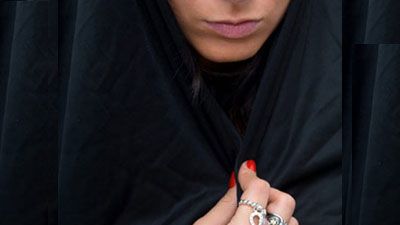Fighting a "Forced Divorce"
Picture this: You're newly married, pregnant, rudely happy -- till your family tells you to ditch your husband; they don't like the guy. Then they go to court and get you a divorce. That's what happened to Fatima Bent Suleiman Al Azzaz.

Picture this: You're newly married, pregnant, rudely happy — till your family tells you to ditch your husband; they don't like the guy. Then they go to court and get you a divorce. Sounds insane, but that's what happened to Fatima Bent Suleiman Al Azzaz, a computer instructor in Saudi Arabia. Her half-brothers decided her marriage was over, and had the union dissolved in 2005, marking one of the first reported cases of "forced divorce." But Fatima and her husband refused to split — so she was sent to prison. Fatima, 35, is out now, stepping up her fight to get back her man. Naturally, we had questions for her...
Q: How can a couple get divorced against their will?
A: According to Islamic tradition, a woman spends her life under the legal guardianship of a male relative who must consent to her marriage. My father had approved my marriage, but before he died, my half-brothers convinced him to transfer my guardianship to them. Their plan was to petition for my divorce and gain control of my inheritance. Still, I was stunned when the judge agreed.
Q: What's the story with your half-brothers?
A: My father had two wives, which is allowed in Islam, so I have full brothers and sisters, as well as half-brothers. Initially, my mother and full siblings were on my side, but now they just want me to give in and preserve family harmony.
Q: What happened when you refused to accept the court's ruling?
A: We filed an appeal with a higher court in 2007, but lost. Meanwhile, my half-brothers notified the police. Since we were no longer legally married, my husband and I could be arrested for adultery, which is how I got sent to prison, along with my two kids. My husband was blacklisted by the government, which meant his bank account was frozen and he could not get a job. Ever since then, he has been living off donations from people around him; in Islam, there is a religious obligation to give part of your income to people in need.
Q: You were in prison for nine months. What was it like?
A: I was terrified. The cell was dirty, and most of the women were murderers and drug addicts. I was not allowed to see my husband, although I would shout to him from a nearby room when he came to visit the children. Eventually, my daughter, who was 2, went to live with my husband, but my son, who was a baby, stayed with me in jail. After I was released, my son and I moved into a state-run orphanage, which is where I live now.
Q: Have you seen your husband and daughter since your release?
A: No. I am not allowed to leave or to see visitors here. My husband and I communicate through friends. We just want our family to be together again.
IF YOU'D LIKE TO SUPPORT FATIMA'S CASE...
Send a fax to: His Majesty, King Abdullah bin Abdul Aziz Al Saud, Kingdom of Saudi Arabia, at 011-966-1-491-2726. For a sample letter and more information, go to EqualityNow.org.
Get exclusive access to fashion and beauty trends, hot-off-the-press celebrity news, and more.